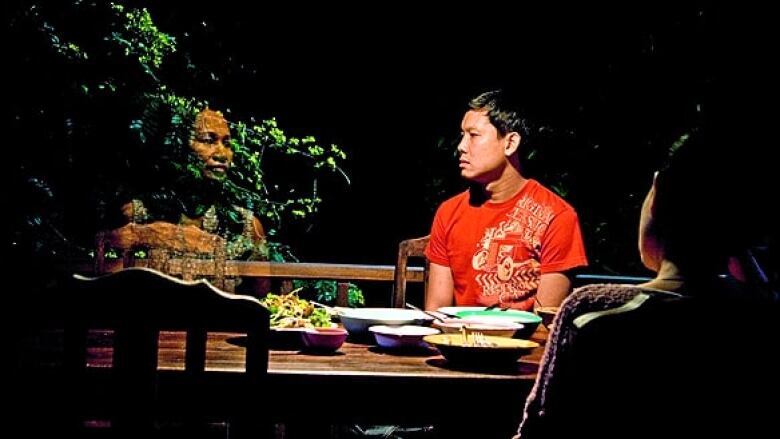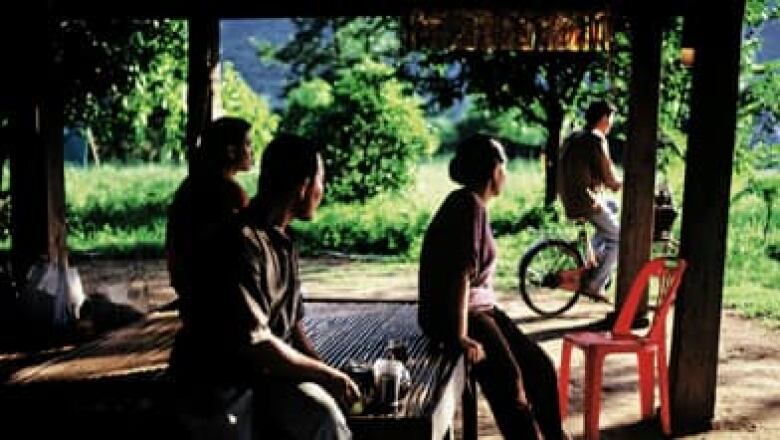Spirits in the material world
A conversation with the director of this year's Cannes Palme d'Or winner

(This article was originally publishedduring the 2010 Toronto International Film Festival.)
A dying man is visited during dinner by the ghost of his dead wife. A youth is transformed into a monkey spirit with glowing crimson eyes. A disfigured princess has an erotic encounter with a catfish.
Uncle Boonmee WhoCan Recall His Past Livesis one of the stranger works to win the esteemed Palme d'Or at the Cannes Film Festival. But it's an enchanting, quietly moving tale.
No doubt about it, Uncle Boonmee Who Can Recall His Past Lives is one of the stranger works to win the esteemed Palme dOr at the Cannes Film Festival. But if you give yourself over to its languorous rhythms, its also an enchanting, funny and quietly moving tale that makes permeable the boundaries between past and present, life and death.
The movie, now at the Toronto International Film Festival and slated to run at TIFFs Bell Lightbox later this month, was written and directed by Thai auteur Apichatpong Weerasethakul. In the West, he goes by the name of "Joe" and he looks very Joe-like on the morning following the first festival screening of his film. Hes dressed casually in a patterned long-sleeve shirt, unbuttoned over a black T-shirt, and baggy brown pants. Hes just as unassuming when he discusses Uncle Boonmee, whose unexpected win at Cannes this past May left him in a daze.
"It was a strange feeling," he says in capable English, seated in the offices of Toronto distributor FilmsWeLike. "I felt happy, of course, but I was not like myself. I was really on a cloud for one or two days. It was like I was another person."
That out-of-body experience is perfectly in keeping with the film itself. Set in the countryside of northeastern Thailand, it follows the last days of Boonmee (Thanapat Saisaymar), a farmer suffering from kidney disease. The old man is watched over by his young nephew, Tong (Sakda Kaewbuadee), and crippled sister-in-law, Jen (Jenjira Pongpas). The spectre of Boonmees long-dead wife (Natthakarn Aphaiwonk) soon joins them, as well as their missing son (Geerasak Kulhong), in the shape of that aforementioned ghost monkey.
Weerasethakul blends matter-of-fact details the maintenance of Boonmees catheter, the swatting of insects buzzing round a lamp with dream-like episodes that resemble fairy tales or old horror movies. Boonmee has the gift of being able to remember previous incarnations and some of these make their way into the story, though Weerasethakul is never explicit as to what bodies the old man has inhabited in the past.
The 40-year-old filmmaker, who was born in Bangkok but grew up in the countrys northeast Isan region, says Uncle Boonmee was inspired by a book he discovered at a Buddhist temple near his family home in Khon Kaen. "It was this little book that a monk there had self-published and distributed to the villagers for free," he recalls. "The monk wrote about this guy who came to the temple, who claimed to remember his past lives."
Weerasethakul didnt adapt the book, but instead used it as the jumping-off point for what turned out to be a very personal film. "I grasped onto its theme of remembrance," he says. "In the end, I put a lot of myself into it. It became Uncle Apichatpong," he says, laughing.
The films private references include Boonmees illness Weerasethakuls father, a doctor, also died of kidney failure as well as allusions to the movies and comic books the director devoured in his youth. Those red-eyed ghost-monkeys, for example, pay homage to the low-budget sci-fi and horror flicks he watched on television as a kid.
But the film is more than an exercise in nostalgia. Its part of a bigger project, begun in 2006, in which Weerasethakul is trying to document the vanishing culture of his homeland. "The northeast is changing so quickly today," he says. "I felt it was important to see what has passed and what remains." He and a film crew travelled along the Mekong River, getting people to share their memories of the past. Apart from Uncle Boonmee woven from Weerasethakuls own memories the Primitive project has yielded an international art installation focusing on a communist village that was occupied by the Thai military during the Vietnam War era.

Photos from the project are inserted midway through Uncle Boonmee just one of the unconventional touches that have earned Weerasethakuls films a reputation for being enigmatic and controversial. His 2004 film Tropical Malady, which follows the flirtation of two gay men (one of them Tong, who reappears in Uncle Boonmee), provoked boos and walkouts at Cannes then went on to win the festivals jury prize.
His 2006 release, Syndromes and a Century, topped TIFFs international poll as the best film of the last decade. But in Thailand, it ran afoul of the censors, who wouldnt allow it to be shown without cuts. (They objected to scenes that showed what they considered to be inappropriate behaviour, such as doctors kissing in a hospital and monks playing with a remote-control toy.)
Uncle Boonmee is also provoking diverse reactions. During a TIFF screening for the press and film industry reps, there was a steady trickle of people heading for the exit, unable to endure its leisurely pace.
Weerasethakul explains that the pictures slow unfolding is intended as a tribute to the beloved movies from his childhood. "In one of those old films, when, say, a man and a woman are flirting with one another, it could take five or 10 minutes," he notes. "Theyd go to a river, theyd go to a mountain. They took time in the old days."
As hes saying this, a publicist steps in and, with ironic timing, tells me to wrap up this 15-minute interview. "Its too quick!" Weerasethakul says with a laugh.
Theres just time for one more question. Has winning the Palme dOr had any effect yet on his career?
Yes, he says. "This the first time one of my movies is being distributed in many countries. Of course, it will divide audiences, as usual," he adds with a smile. "But I hope it will get to some audiences who can feel connected to it."
Uncle Boonmee Who Can Recall His Past Lives opens at the TIFF Bell Lightbox in Toronto on Sept. 23.
Martin Morrow writes about the arts for CBC News.












_(720p).jpg)


 OFFICIAL HD MUSIC VIDEO.jpg)
.jpg)



























































































